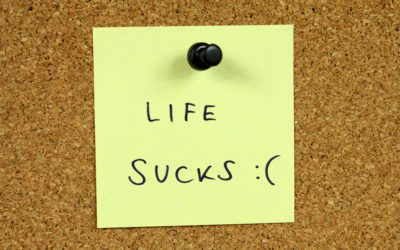Today’s blog is adapted and excerpted from the newly revised and updated 10th anniversary edition of Supercoach, available this fall from Hay House…
Recently, a woman whose thoughts were in a terrible spin called in to my radio show. She was worried about everything and trying to solve all her problems at once. I interrupted her litany of woes and asked her what I’m sure she thought was a complete non-sequitur.
“If you had a bowl of murky water and you wanted to make that water clear,” I said, “what would you do?”
She thought for a moment and then suggested boiling it.
I laughed because I recognized that this was exactly what she was doing with her own thoughts. She was attempting to gain clarity by trying harder than ever to figure everything out. As a strategy, this is like increasing traffic to reduce pollution, turning up the volume to drown out the noise, or attempting to bomb your way to a peaceful resolution. It’s not that these strategies have never been attempted; it’s just that they hardly ever work.
If you want to make murky water clear, you have to leave it alone long enough for the murk to settle. The reason this works is because the nature of water is clear. The nature of the mind is clear, too, and the nature of a human being is well.
At this deeper level of humanity, there are no boundaries—we are all one. Even at the level of our personalities, we all want the same things: to love and be loved, to care and be cared for, and to live as happily as we can in whatever world we’ve been born into. In times of crisis, this common humanity tends to come to the fore, which is why we’ll often come across acts of incredible kindness, understanding, and compassion in the face of great tragedy.
Exploring our deeper nature is a lifetime pursuit and is the endgame of a number of spiritual traditions and practices. But most of us get so caught up in the drama of our personalities that we miss out on the joy and wisdom that are an ever- deepening presence at the level of our essential selves.
The Birth of a Personality
I once watched a somewhat laughable 1950s romantic drama called Scaramouche starring Stewart Granger and Janet Leigh. In the movie, a hideously scarred actor has been making his living playing a masked romantic clown by the name of Scaramouche. At some point, unbeknownst to the local police, his mask is taken over by a handsome political radical played by Granger.
Granger is able to function right under the noses of the local police because they believe they know all about the hideous creature that lives beneath the mask. In the same way, most of us have spent so long pretending to be whatever it is we’re pretending to be that any pretense of living from our true selves is long gone. We begin to make up a new story, one based on our underlying awareness that we’re not who we appear to be—that at any moment, we’ll be unmasked and found out as the phonies and frauds that we are. The more energy we put into developing our mask, the more convinced we become that we really need one.
Unlike our true nature, which is something we’re all born with, our personalities are conditioned and maintained throughout our lives. At first, they develop as a kind of unconscious reaction to what is going on in the world around us.
To better understand this, imagine yourself inside a “motel womb.” You’ve been there for around nine months, so you’re feeling completely at home, although lately things have been a bit cramped. You’re relaxing on your heated waterbed, snacking on placenta-flavored potato chips, minding your own business, when all of a sudden—boom!—you feel an earthquake start to shake the bed. Before you know it, you’re being pushed out through the door by an unseen force with the intensity of a tornado. You stumble out into the blinding light, get smacked on the behind by a masked giant, and begin to scream.
It’s hardly surprising at this point that we might feel disoriented, disconnected, and in danger. And that initial experience of danger is so profound we begin to crave “security”— the knowledge that not only are we safe now, but that we’ll always be safe. Whenever we feel unsafe, we seek to control our environment and particularly the people around us in order to return to safety. Now, some of these people will allow us to “control” them through the intensity of our feelings, especially if through our anger or sadness or fear, we’re able to stimulate their own insecure thinking and desire to be safe. But sooner or later we come to the realization that we can’t control everyone.
However, even if we can’t control people, we soon work out that we can still stay safe around them.
How?
Well, it turns out that if people approve of what we’re doing, they won’t hurt us (most of the time). So we learn to be “nice” and to do as we’re told so that “they” approve of us and we get to stay safe—at least for as long as they keep approving of us.
In doing so, we begin to develop a personality—an act—that will fool all those scary giants out there into believing that we’re actually the way they want us to be. The problem comes when we forget that it’s just an act—when we start to believe that we actually are who we’ve been pretending to be.
As a friend of mine once put it:
Most coaching is focused on finding better ways to apply the nail polish. Most therapy is spent digging through the horse crap. But the “supercoach approach” is to go inside and uncover the diamond within.
- Reflect on a few times in your life where your essential nature was shining through even while there was a bunch of ‘crap’ going on. Did you have to do anything to ‘make’ that happen, or did it just happen seemingly all by itself?
- Who would you still be even if you’d been born into a different family, a different country, or a different century?
With all my love,
![]()





